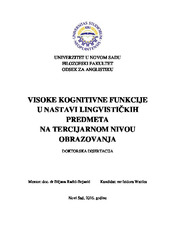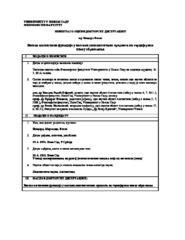Приказ основних података о дисертацији
Visoke kognitivne funkcije u nastavi lingvistiĉkih predmeta na tercijarnom nivou obrazovanja
Higher cognitive functions in linguistic courses in tertiary education
| dc.contributor.advisor | Radić-Bojanić, Biljana | |
| dc.contributor.other | Novakov, Predrag | |
| dc.contributor.other | Pilipović, Vesna | |
| dc.contributor.other | Radić-Bojanić, Biljana | |
| dc.creator | Вотлс, Исидора | |
| dc.date.accessioned | 2017-05-31T12:23:32Z | |
| dc.date.available | 2017-05-31T12:23:32Z | |
| dc.date.available | 2020-07-03T14:23:31Z | |
| dc.date.issued | 2016-06-22 | |
| dc.identifier.uri | https://nardus.mpn.gov.rs/handle/123456789/8169 | |
| dc.identifier.uri | http://www.cris.uns.ac.rs/DownloadFileServlet/Disertacija145916164185736.pdf?controlNumber=(BISIS)100344&fileName=145916164185736.pdf&id=5162&source=NaRDuS&language=sr | sr |
| dc.identifier.uri | http://www.cris.uns.ac.rs/record.jsf?recordId=100344&source=NaRDuS&language=sr | sr |
| dc.identifier.uri | http://www.cris.uns.ac.rs/DownloadFileServlet/IzvestajKomisije146105642450055.pdf?controlNumber=(BISIS)100344&fileName=146105642450055.pdf&id=5395&source=NaRDuS&language=sr | sr |
| dc.description.abstract | Iskustvo u radu sa studentima pokazalo je da studenti nedovoljno ĉesto ostvaruju zadovoljavajuće ishode uĉenja na lingvistiĉkim predmetima na studijama engleskog jezika, što je takoĊe opisano i u stranoj literaturi. Kao jedan od razloga navodi se nastava koja upućuje studente na pasivnost, te oni pribegavaju memorisanju i reprodukciji materijala kao najĉešćim ishodima uĉenja. Biggs (1999) razraĊuje koncepte dubinskog i površinskog pristupa uĉenju, koje relevantna literatura smatra kljuĉnim faktorima za kvalitet ishoda uĉenja. Dubinski pristup uĉenju korelira sa kvalitetnim ishodima uĉenja i funkcionalnim znanjem, a karakterišu ga motivacija, zadovoljstvo usled uĉenja, studentska aktivnost i to aktivnost visokih kognitivnih funkcija. Visoke kognitivne funkcije (Bloom i dr. 1956, Anderson i dr. 2001) i povezane kognitivne radnje (rešavanje problema, analitiĉko, kritiĉko i kreativno razmišljanje) jesu najvaţniji ciljevi visokog obrazovanja jer samo one, usled primene transfera uĉenja, govore o steĉenom i primenljivom, tj. funkcionalnom znanju. Obuka i razvoj visokih kognitivnih funkcija omogući će studentima da uĉenju pristupe dubinski što je još jedan razlog da budu osnovni nastavni cilj svih predmeta na ustanovama tercijarnog obrazovanja. U skladu sa ovim teorijskim postavkama postavljene su osnovna i pomoćna hipoteza: upotreba posebno konstruisanih veţbi za aktivaciju viših kognitivnih funkcija u nastavi lingvistiĉkih predmeta dovešće do sticanja funkcionalnog znanja na teorijskom i praktiĉnom nivou; steĉeno znanje kroz ovakvu eksperimentalnu nastavu i upotreba tog znanja odraţavaće kognitivne funkcije ne samo niţeg nego i višeg reda: primeniti, analizirati, proceniti, stvoriti, kao i kritiĉko i kreativno razmišljanje i rešavanje problema. Kako bi se proverile hipoteze, sproveden je eksperiment sa studentima prve godine engleskog jezika (N=34) na Fakultetu za pravne i poslovne studije dr Lazar Vrkatić u Novom Sadu. U istraţivanju sa paralelnim grupama, eksperimentalna grupa je imala veţbe sa aktivnostima koje razvijaju više kognitivne funkcije na predmetu uvod u opštu lingvistiku tokom zimskog semestra školske 2012/2013. godine. UporeĊeni su kvantitativni rezultati kolokvijuma eksperimentalne i kontrolne grupe na kraju semestra, a potom je sproveden intervju sa po pet studenata iz svake grupe radi utvrĊivanja kvalitativnih razlika u kognitivnim procesima kod ove dve grupe. Obe grupe su ostvarile podjednak uspeh na kolokvijumu, te je osnovna hipoteza odbaĉena. Kodirani podaci iz intervjua pokazali su da obe grupe podjednako koriste kognitivne funkcije po broju i distribuciji, te je i pomoćna hipoteza odbaĉena. Kao objašnjenje za odsustvo većeg uspeha EG navedena su metodološka ograniĉenja istraţivanja: duţina eksperimentalne nastave, problem dokazivosti transfera i problem kodiranja intervjua. Drugi faktori koji mogu objasniti neuspeh su: prethodno steĉene navike u uĉenju, neshvatanje svrhe izuĉavanja predmeta i dr. UporeĊeni su rezultati boljih i slabijih studenata, te je utvrĊeno da bolji studenti pokazuju veći stepen samostalnosti, da upotrebljavaju više kognitivne funkcije kao i duţe nizove kognitivnih radnji. Posmatrajući kvalitativne podatke, bolji studenti eksperimentalne grupe pokazali su promenu gledanja na svet usled izuĉavanja lingvistike i izrazili su zadovoljstvo zbog uĉenja ovog predmeta. Oni pokazuju i upotrebu najduţih nizova vezanih kognitivnih radnji. Iz ovoga se moţe zakljuĉiti da su oni pristupili uĉenju dubinski i zbog toga ostvarili kvalitetnije ishode uĉenja. U cilju donošenja ĉvrstih zakljuĉaka neophodno je sprovesti dugotrajniji i obuhvatniji multidiciplinarni istraţivaĉki projekat, s obzirom da bi pozitivni rezultati bili od velikog znaĉaja za poboljšanje ishoda uĉenja na tercijarnom nivou obrazovanja. Ključne reči: uĉenje i nastava na tercijarnom nivou, taksonomija obrazovnih ciljeva, pristupi uĉenju, više kognitivne funkcije, transfer uĉenja, funckionalno znanje. | sr |
| dc.description.abstract | The experience of working with university students has shown that the learning outcomes of linguistic courses are infrequently satisfactory, which is also described in literature worldwide. Teaching philosophy in which students are forced into passives roles is one of the causes since such teaching results in low motivation with memorizing and reproduction of learned materials as the most frequent outcomes of learning. Biggs (1999) develops the concepts of deep and superficial learning approaches which have been declared in the relevant literature as key factors for the quality of learning outcomes. Deep approach to learning correlates with high quality learning outcomes, and is characterized by high motivation, satisfaction with learning and student activity of appropriately high cognitive levels. Higher cognitive functions (Bloom et. al. 1956, Anderson at al. 2001) and related cognitive activities (problem solving, analytical, critical and creative thinking) are the most important goals of higher education since these thinking skills are transferable and therefore represent applicable and functional knowledge. The training and development of the higher cognitive skills enables students to use deep approaches to learning, which is an additional reason to consider them as fundamental teaching goals in all courses in tertiary education. Based on this theoretical framework the main hypothesis and sub-hypothesis were formulated as follows: the use of specially designed practices which activate higher cognitive functions (HCF) will result in acquiring functional knowledge at both theoretical and practical levels; the knowledge gained through such teaching will reflect the use of higher cognitive functions: apply, analyze, evaluate, create, as well as show problem solving skills and critical and creative thinking. To test the hypotheses an experiment was conducted with the first year English language students (N=34) at the Faculty of Legal and Business Studies dr Lazar Vrkatić in Novi Sad. In the parallel groups design, the experimental group (EG) was involved with activities which develop HCFs in the course of Introduction to General Linguistics during the winter semester of the 2012/2013. Quantitative data were collected at the end of the semester (the final test) and compared between the two groups to determine whether the EG scored better results than the control group (CG). This was followed by interviews with five respondents from each group to qualitatively compare the cognitive processes. No statistically significant difference between test results in the two groups was found and so the main hypothesis was rejected. The coded data from the interviews showed an equal number of identified CFs with both groups with similar distribution patterns, thus the sub-hypothesis was also rejected. The absence of better scores of the EG can be explained by some methodological limitations of the experiment, such as the length of the experimental activities, the problem of proof of transfer and the coding of the interview data. Other factors include the existing learning habits of students, the inability to grasp the purpose of studying linguistics, etc. The results of better students were compared to those of the weaker ones, which showed that better students are more autonomous, use a greater number of HCFs and string more CFs into a complex response. Qualitative data also showed that better students of the experimental group expressed a change in how they see the world around them and express satisfaction because of studying linguistics. They also string the longest chains of cognitive activities. These findings lead to a conclusion that better students of the EG used deep approaches to learning which resulted in higher quality learning outcomes. In order to achieve conclusive results, a comprehensive long-term multidisciplinary research project should be carried out, since its results would have a significant impact on the quality of learning outcomes in tertiary education. | en |
| dc.language | sr (latin script) | |
| dc.publisher | Универзитет у Новом Саду, Филозофски факултет | sr |
| dc.rights | openAccess | en |
| dc.rights.uri | https://creativecommons.org/licenses/by/4.0/ | |
| dc.source | Универзитет у Новом Саду | sr |
| dc.subject | Uĉenje i nastava na tercijarnom nivou | sr |
| dc.subject | learning and teaching at tertiary level | en |
| dc.subject | taksonomija obrazovnih ciljeva | sr |
| dc.subject | pristupi uĉenju | sr |
| dc.subject | više kognitivne funkcije | sr |
| dc.subject | transfer uĉenja | sr |
| dc.subject | funckionalno znanje | sr |
| dc.subject | taxonomy of educational goals | en |
| dc.subject | approaches to learning | en |
| dc.subject | higher cognitive functions | en |
| dc.subject | transfer of learning | en |
| dc.subject | functional knowledge. | en |
| dc.title | Visoke kognitivne funkcije u nastavi lingvistiĉkih predmeta na tercijarnom nivou obrazovanja | sr |
| dc.title.alternative | Higher cognitive functions in linguistic courses in tertiary education | en |
| dc.type | doctoralThesis | en |
| dc.rights.license | BY | |
| dcterms.abstract | Радић-Бојанић, Биљана; Новаков, Предраг; Пилиповић, Весна; Радић-Бојанић, Биљана; Votls, Isidora; Високе когнитивне функције у настави лингвистиĉких предмета на терцијарном нивоу образовања; Високе когнитивне функције у настави лингвистиĉких предмета на терцијарном нивоу образовања; | |
| dc.identifier.fulltext | https://nardus.mpn.gov.rs/bitstream/id/46048/IzvestajKomisije9384.pdf | |
| dc.identifier.fulltext | http://nardus.mpn.gov.rs/bitstream/id/46047/Disertacija9384.pdf | |
| dc.identifier.fulltext | https://nardus.mpn.gov.rs/bitstream/id/46047/Disertacija9384.pdf | |
| dc.identifier.fulltext | http://nardus.mpn.gov.rs/bitstream/id/46048/IzvestajKomisije9384.pdf | |
| dc.identifier.rcub | https://hdl.handle.net/21.15107/rcub_nardus_8169 |



